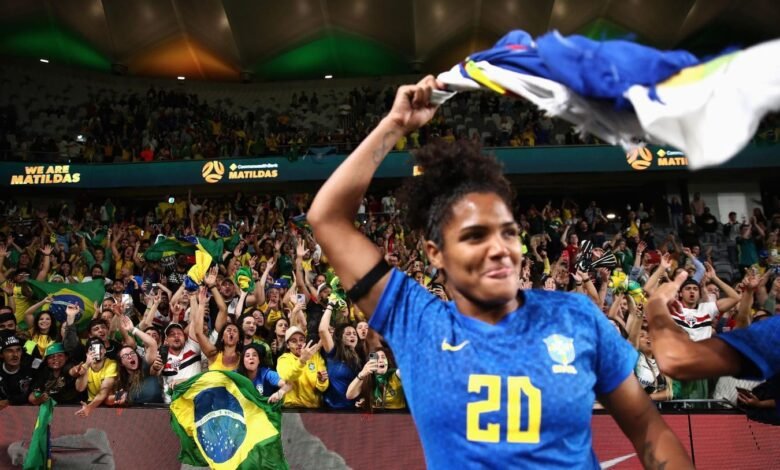Brazil leads the race to host the 2027 Women’s World Cup

SYDNEY, AUSTRALIA – OCTOBER 26: Maria Eduarda Francelino Da Silva of Brazil celebrates with fans … [+]
In the three-horse race for the next Women’s World Cup, Brazil has always been an outsider. FIFA, the governing body of world football, had good reason to prefer the joint North American bid of Mexico and the United States or the European bid of the triumvirate of Belgium, the Netherlands and Germany (BNG): these two bids represented core markets that could deliver guaranteed revenue and a path to post-tournament prize money equality in far-flung Australia and New Zealand.
But earlier this month the US and Mexico withdrew and last Tuesday FIFA’s candidacy evaluation report named Brazil as the candidate with the best credentials. BNG’s offering was marked with a rating of 3.7. Brazil obtained 4.0.
The European candidacy was defeated due to a high risk score in its legal framework. The report noted of Belgium, BNG’s junior partner: “Specific areas where the level of commitment required by FIFA has not been met include taxes, immigration procedures, labor legislation and safety and security… FIFA is exposed to potential liabilities unforeseen finances. and operational delivery risks.”
FIFA also identified fiscal risks in the Netherlands and highlighted some problems in Germany. Zurich is used to benefiting from large tax incentives as part of hosting contracts in countries hosting the World Cup. To have a chance in a World Cup bid process, potential host countries cannot deviate from a requirement that FIFA considers crucial to its operations and the well-being of its officials.
BNG’s bid has always had specific problems: small stadiums, Belgium as a minor co-bidder, Europe’s unpopularity in the rest of the world and Gianni Infantino’s antipathy towards the UEFA region. This was perhaps best achieved by the head of the Belgian federation, Pascal Van Damme, one of the few female presidents in the world, who delivered a message of sustainability and diversity to influence other football associations. These concerns hardly convinced the FIFA family, even if the technical assessment highlighted BNG’s “compact footprint in tournaments”.
Van Damme had no qualms about lobbying Saudi Arabia and Qatar, countries with controversial human rights records. The Europeans targeted Asia and Africa, confederations rich in votes, and were present at the Club World Cup in Jeddah last December, and both the Asian Cup and the African Cup of Nations in early 2024.
At that time, Brazil was once again in the midst of an institutional crisis. A Rio court removed CBF president Ednaldo Rodrigues from the presidency, ordering new elections. They were never staged. FIFA intervened behind the scenes to keep Rodrigues, a member of the FIFA Council, in power.
Any such crisis should have decimated a candidate country’s chances of securing hosting rights, but in this race, even after the US withdrew – the Americans have a decade of football ahead of them with the 2025 Club World Cup, the The 2026 World Cup, the 2028 Olympic football tournament and a potential bid for the 2031 Women’s World Cup – not everything is as it seems.
FIFA judged the legal aspects of the Brazilian candidacy to be low risk. The bid evaluation report noted that “…make the 2027 FIFA Women’s World Cup a success or more successful than the 2014 FIFA World Cup Brazil, among others, by implementing a similar events law.”
At the time, Brazil implemented a special World Cup law to circumvent its own legislation. FIFA, however, left Brazil exasperated, happy to leave the country’s bureaucracy and notorious inertia behind. Brazil’s current high score therefore comes as a surprise, although the South Americans have solid arguments: Brazil held a successful 2014 World Cup and the region has never hosted a Women’s World Cup.
A CBF source said it all comes down to what Infantino wants. It is Congress that will vote on the host award for the first time, but the influence of Infantino, an executive president, cannot be underestimated.
Perhaps the fact that Infantino defended Saudi Arabia as host of the 2034 World Cup is the main clue. Conmebol, South America’s regulatory body, too easily abandoned its dream of hosting the 2030 World Cup, contenting itself with just three matches. So is the 2027 Women’s World Cup a consolation prize for South America? This would explain why Brazil is so confident that in 2027 another major tournament will come to their country.




